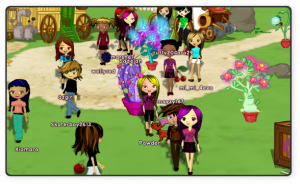 Are “cheat codes” a symbol of impatient multi-taskers incapable of working through frustration that need to leap frog over the hard part of life? Or a conduit to open new challenges at higher levels of engagement at a self-motivating pace?
Are “cheat codes” a symbol of impatient multi-taskers incapable of working through frustration that need to leap frog over the hard part of life? Or a conduit to open new challenges at higher levels of engagement at a self-motivating pace?
With fuzzy ethics, blurred boundaries and zig-zags aplenty in immersive gaming environs, I’d say “cheats” is a loaded term in and of itself.
After all, even in ‘serious games’ and dvd/film media developers often embed little ‘surprises/Easter eggs’ for avid enthusiasts to discover, not to mention ‘bonus discs’ and extras to extend the media ‘experience.’
I was just having this conversation with Sandra Foyt, On Living by Learning, who ran it past her kids, and family of youth readers too, in her piece called “Who wins with GameBoy cheats?” In the comments, one of her readers impressively captures the vehement voice of youth with balanced, measured candor…
“When most non-game players (i.e. parents) hear the word “cheat” they assume there is some ethical issue at stake. In fact many video games cannot be fully enjoyed with employing secret codes to enhance game play. These go by the unfortunate name of cheats which is not entirely appropriate. 95% of the cheats are designed in by game developers as sort of a extra hidden surprise that encourages players to talk to each other about game strategies and tips. Can these really be called unethical cheats?”
(comment posted by Guitar Hero Cheats)
 In Sandra Foyt’s own follow-up article to this conversation, A Game Ethics Lesson from Karate Kid, (photo from her blog at left) she explains:
In Sandra Foyt’s own follow-up article to this conversation, A Game Ethics Lesson from Karate Kid, (photo from her blog at left) she explains:
“In single-player games, it’s argued that cheats are an acceptable solution when you’re short on time, or the game is too difficult.
When playing multi-player games; however, gamers complain that cheats invalidate the rules of the game.”
Then she asks a biggie:
“Aren’t unfair video games just like the real world?…”I wonder if the existence of cheats – which creates unequal opportunities – just make video games more of a real world experience. And, when we see gamers ripping off the gullible, isn’t this good preparation for what you can expect in life?” said Sandra.
She makes the point that she doesn’t truly believe human nature is inherently opportunistic, and reiterates that it isn’t a lesson she wants her kids to learn, adding another media literacy nugget:
“…Regardless of whether video game ethics mirror real world dilemmas, or perhaps because they can, video games offer an opportunity for kids to learn about morality.”
I completely agree. The conversational opportunity is key…
Unlocking ‘cheats’ to glean new horizons ‘in game’ has gone from peer to peer ‘viral’ word of mouth to website form which seems to reflect the same dynamic in a different distribution channel...
Perceived as a destructive crutch to some gaming purists, life lessons or plain ol’ fun-finds to others, the fact remains that these advantages have evolved to a new level of prominence.
What about ‘game cheats’ impact on very young kids?
Can children discern the ethical implications of their actions in the context of commercial communities like Webkinz or Build A Bear or even Club Penguin?
What about immersive worlds like Whyville or Zookazoo, where there’s more abstract thinking and nuanced play?
I asked Zookazoo’s Michael Carter (highly respected in Digital Youth Research) since his multi-faceted gaming background enables him to elucidate much further than yours truly, (he’s always opening my eyes to fresh critical thinking in new ways, from different angles) Michael matter-of-factly said:
“WHO are the cheats “cheating?” It’s their time to use, and it depends on what form of knowledge-culture the kids are coming from.”
He even went so far as to say he’d find it ‘charming’ if someone posted Zookazoo virtual world cheats and workarounds —It would just mean kids are “playing a different game.” The incredulous ‘say what?’ look on my face must’ve shown…prompting him to elaborate further…Michael Carter said:
“Look, some kids click through to get the gist, find what’s new, or see if it’s worth returning…Others use it to bridge to new info that holds their interest or when they get stuck…Some social-share with friends…informal learning comes in all kinds of forms, it’s just another way to play the game.”
Hmn. Never thought of it that way…
Diffuses a lot of the angst, saying it’s “just another way to play the game.” See? I told you he makes me think differently.
He also mentioned a player in Zookazoo who’s a ‘quick change artist’ and likes to show up at their virtual summer concerts mirroring the moderator/Zookazoo company presence.
My cartoon thought-bubble snapped to, “Uh-oh, imposter/mirroring–breach of trust potential–danger Will Robinson!”
Regular readers will be amused to hear I even started down the parental path of ‘how do you KNOW it was a child’ age verification inquisitions, before I self-reined hearing danah boyd’s voice bouncing around in my brain on the perpetuation of ‘moral panic’ in media reporting about internet risks)
Meanwhile, Michael Carter’s assessment?
“S/he must be fairly sophisticated with technology or an avid gamer to change appearances that fast…I love this kid, because it’s all about trying on different roles and personas; building a space with a distinctive presence where kids can rehearse…for life.”
 Wow. Ok, so clearly I’ve been spending far too much time in the nefarious marketing underworld of outing product placements ‘in-game’ and keeping eyes peeled for adults with an agenda, as my worrywart ways were creeping in…even KNOWING the safeguards and parent pledges on the Zookazoo team.
Wow. Ok, so clearly I’ve been spending far too much time in the nefarious marketing underworld of outing product placements ‘in-game’ and keeping eyes peeled for adults with an agenda, as my worrywart ways were creeping in…even KNOWING the safeguards and parent pledges on the Zookazoo team.
I really need to join the adorable little Zookazoo panda (at left) in getting back to nature before I become an endangered species in the realm of level-headed logic…
Hop-scotching over the ‘cheats’ issue for now (which I’ll daintily call “”info-sharing”) and glossing over the workarounds and boundary-pushing as developmental, (tweens seem to have innate intrigue with ‘beating the system’ and circumventing the norm in ‘go for it because you can’ thinking, often enhanced by anonymity)…Let’s address the promise/perils of virtual worlds in terms of kids’ acquired knowledge to revisit the core question…
What HELPS foster ethical thinking? As I said yesterday in Part One of this post…
RezEd.org (great community hub for learning and virtual worlds) opened up this vital conversation focusing on the Good Play Project research.
Evidently, they interviewed young gamers to get a sense of context in various virtual worlds, and why people behave as they do (social/antisocial)
It not only mirrors the same patterns we’ve observed with kids and collegiates in virtual worlds it reflects the patterns of ADULT players we’ve observed too. (including SL)
The Good Play Project research noted,
“Many players doing “unethical” things justify their actions by downplaying their significance, arguing that “it’s just a game”; others justify and condemn actions only in the context of the rules set by designers, arguing that “if the game allows you to do it, go for it.”
“There are some players, however, who evaluate their actions by asking whether they support, or impede, the goals of their in-game guild or of the game community as a whole…”
“We consider the latter to be “ethical thinking,” which seems important to encourage in Virtual World participants, both because it will help improve their online communities and possibly engender ethical thinking in other, offline contexts.”
So how can we take those ‘greater good’ patterns that emerge for ethics and apply them in such a way that we ditch malicious meanness, cyerbullying, or outright pilfering of goods to create informal codes of conduct that reward the positive?
 We’re already seeing instances of this in some of the collaborative play inside of virtual worlds like Zookazoo and Dizzywood. (at left, collaborative planting of gardens)
We’re already seeing instances of this in some of the collaborative play inside of virtual worlds like Zookazoo and Dizzywood. (at left, collaborative planting of gardens)
Also, positive actions in eco-gaming and online to offline segues like the forum for Hulala Girls (Green Wall) and the all-new Elf Island (which is coming soon—Heads up, kids, they’re “now boarding for bragging rights” as a charter/founder of this new world)
Seems building an ethical community is partly a matter of setting a welcome, meaningful tone, (beyond coinage and consumption toward self-created content and imaginative play) and then fully embracing it to create a safe, comfortable, community-driven vibe of exploration and discovery.
Virtual worlds can’t do this without effective moderators and expectations that lend themselves to mentoring over mayhem. Community trust is pivotal, and certain things can set the tone for a positive rather than negative experience…as simple as holding one’s hand, so to speak.
 Last week, for instance, BlogHer’s soldout national conference set up ambassadors of goodwill in Second Life to handle the overflow.
Last week, for instance, BlogHer’s soldout national conference set up ambassadors of goodwill in Second Life to handle the overflow.
They ensured virtual world visitors would be guided through meet and greet/teleport ease rather than wandering around bumping into trees on Help Island trying to figure out how to get from point A to point B…(I still ending up being out of town and unavail, drat it!)
That act of kindness really helps people become ‘invested’ in the experience, comforted by the trust of others in the world, and their inherent responsibilities to the people who have welcomed them into the community…
It sets a ‘tone’ of camraderie.
Similarly, kids’ virtual worlds all have informal ‘rules’ of each online experience, each with its own culture and strong sense of relationship.
Why do you think the news of Virtual Magic Kingdom closure made kids ballistic when Disney yanked the concept and rendered it obsolete? Talk about taking candy from a baby! (see comments section of Izzy Neis’ blog here)
The tighter-knit the community, the stronger the ethical sense of networking in a shared sandbox. This opens up a whole community context and with it, a responsibility and accountability for those designing such media environs…
 In most of these worlds, you can sniff out a “stranger in a strange land” at forty paces…which bodes well for both real world AND online worlds triumphing over gnats and pests that thwart the learning environs if a solid group subculture can prevail.
In most of these worlds, you can sniff out a “stranger in a strange land” at forty paces…which bodes well for both real world AND online worlds triumphing over gnats and pests that thwart the learning environs if a solid group subculture can prevail.
It’s up to the developers and moderators to follow through on their promise of championing a safe, comfy place to be…not just build it to make a buck and then abandon it, or turn it into a ‘police state’ of clamped down finger-wagging…
More like a ‘virtual neighborhood watch’ program where the community looks out for one another.
More on that concept in Part 3, with Asuka Martin of Teen Second Life and her story about kids banding together to do good things ‘in-world’ on her behalf…
We’ll also see how marketers are using the popularity of “cheats” as a kids’ brand loyalty gimmick ‘in-world.’
What are you finding to be the most ethical conundrums in kids’ virtual worlds? Educators, what are you seeing behaviorally? Kids, what are you experiencing firsthand?
What are best practices for building ethics into game engines from the get-go? (using citizenship, community, leadership, befriending and such?)
And how can we best prevent cyberbullying and peer to peer nasties? Yah, yah, I know, I’m sounding very Pollyanna amidst a Lord of the Flies/Kid Nation/’twas ever thus’ world of youth…but to quote Irisa Hail:
“Don’t let the alarm clock of life wake you from the dream of your ideals.” 😉
Related Resources
Anne Collier’s NetFamily News (my all time favorite newsletter for balanced reporting)
Connect Safely.org’s Safety Tips
Top 8 WorkArounds of Kid Virtual World Users (from NetFamilyNews.org)
- 1. Beating the language filter (spaces/punctuation)
- 2. Code lingo (how many dots are you/creating code chat)
- 3. ID theft, kid-style (password-breaches)
- 4. Stealing virtual possessions
- 5. Abusing abuse reporting (tattling)
- 6. Using safety features to bully (invisible/ghosting/ostracization)
- 7. Digital “Spin the Bottle”
- 8. Kids cheats
Club Penguin Robbery Video on YouTube
Griefers: Gamer Worlds’ Bullies (NetFamilyNews.org)
10 Tips for Dealing with Cyberbullies/Griefers (Microsoft)
Visual Credits: Mario graphic/GameSetWatch.com











This is one meaty article. I’m particularly struck by the suggestion of using positive reinforcement, rather than punishment to encourage ethical behavior in the game worlds.
I sometimes wonder if we actually fan the flames of meanness by bringing so much attention to bad acts. Perhaps, if the media and the para-media (bloggers, etc.)highlighted the positive – collaborative work, for example – then that would be the norm, and not the aberration.
Okay, I’ll be a Pollyanna and say that good gaming behavior is the norm. At least, it is among the kids that I’m privileged to meet.
More games huh? Well Ill chime in here. I personally hated cheat codes. I guess you could say Im a purist. I like to play the game the way it was intended to play. I cant stand the people that say “if its in the game then its OK to use.” Exploiters are very annoying, especially in any competitive online world.
It does make me wonder some times what kind of person would do this type of thing knowing full well its wrong. Its one of the main reasons that I immediately quit any game where someone is exploiting. You can never convince them to stop, all it does is fuel their fire.
From my perspective on the main Second Life grid, apart from the griefers, who seek mostly to amuse themselves by un-amusing the rest of us, the rest of us simply don’t cheat much. This may be because the game backend supports summary ejection and banishment for avatars who get too blatantly crazy, rude or exploitative. So perhaps ethics in gaming, especially online gaming, whether for kids or adults, may come down to thoughtful programming. Determine WHAT ETHICS to support, and designing the games to induce player conduct consistent with those goals has to be part of the answer, difficult though it will be to carry this off.
Answering in reverse order, here:
1.) Helix: Great to hear from you! Since you’re a diehard SL player, your opinion is of great value to me here…It’s also consistent with my observations that SL is a complex world of erudite techies that disdain ‘cheats’ as a rule, since it’s not fun to engage when invincibility is part of the M.O., plus, since you’re on the role play side with all of the ‘city subcultures’ and regional nuances, it seems you’d be ‘cheating yourself’ to ‘cheat’…as that takes away the whole purpose of being there and learning about the creations and quirks of storylines and creative profiles and backstory.
Advocating for game design to include ethical defaults is definitely my preference too if I’m reading you right. In other words, cause and effect tied to consequences in the game itself; e.g. people being bounced, banned, or ear-marked via peer players somehow (e.g. a pseudo-scarlet letter for abusing the system, akin to an ebay feedback rating on a profile)
Might even be fun to test/research a visible deterrent in-game to see how that works, e.g. kinda like paintball where there’s a ‘mark’ on you, that you have to ‘earn off’ somehow or temporary removal of powers or whatever, I dunno…I’m not the morality police, but it seems a P2P solution w/engineering chops to back it up in consistent game play (automatically ‘dissolves’ powers or pulls a level or something) would be an interesting research piece on ethics….as you rightfully say, ‘difficult though it will be.’
2.) VG Hey VG-long time no hear! Did you catch the prelude on this story yesterday? https://shapingyouth.org/blog/?p=1941
Anyway, yes, ‘exploiters’ in competitive MMORPGs or sims (see above note to Helix) usually have the disdain of the majority of avid gamers…many have gone so far as to say that cheat codes are for “wimps and wannabes” that don’t take the time to get to know the culture before plowing forward…
But again, there seems to be a HUGE difference between ‘cheats’ in complex platforms/sims/rpg vs. ‘casual games’ or ‘kids rpg games’ where young people get ‘stuck’ and frustrated and don’t enjoy the experience as much…
As I’ve said before, the Linden/SL dynamic is a bit of a ‘world’ in and of itself as is Teen Second Life, since they both tend to attract the more erudite/inquisitive techno-curious role-playing critters that know how to ‘use their skill sets’ to deter the griefers/ethical ‘thrash and trash’ folks that are used to wreaking havoc online and off…
Teens are learning how to thwart this kind of behavior using social engineering, a value in itself…And overall, it’s a matter of requiring finesse to learn the ‘language’ of the culture within each gaming world if you’re going to play there at all.
That said, you know my thoughts on the desire to have kids OUTSIDE more than ONLINE so there’s a part of me that tends to view the ‘cheats’ in even simpler kids fantasy worlds (neopets, webkinz, VMK prior, etc.) as belonging in the ‘so what’ camp of ‘hey, if they get frustrated, then good, they’ll ditch it and go elsewhere!;-)
Btw, the hilarious satire sessions of YouTube/SL with humans bumping into things w/typing fingers etc. or the http://www.getafirstlife.com that has the big banner at the top, “GO OUTSIDE! MEMBERSHIP IS FREE!” And the clever tag line, “Your world. Sorry ’bout that.” 😉 leave me in ‘ROFL mode.’
3.) Sandra, Agree with you that media tends to go for the sensationalist tripe vs. the positive aspects of gaming behavior overall…
For example, even using ‘cheat’ codes (gawd I HATE that term) I’ve seen some incredibly sweet collaborative play where kids in young tween worlds ‘help each other out’ by knowledge-sharing in ‘here’s how you can do this’ mode to get ‘unstuck’…
This is where semantics get dicey, because sharing ‘tips’ is much more benign than using a word like ‘cheat’—AND who’s to say what constitutes same? As Michael Carter says, it’s THEIR time they’re playing with!
I remember way back in the ‘Freddie Fish’ days when I’d watch kids try to open new knowledge paths and literally ‘shut down’ in exasperation until a peer would help out and lend a ‘go here’ aid…it was interesting watching the friendships form and the trust based on insights, sociologically that seemed to ‘cement’ OFFline for the random act of kindness ONline…
Again, that stuff doesn’t make the news…I guess in some ways, ‘knowledge is power’ tends to apply universally, whether it’s how to serve a volleyball offline, or how to access a cool way to do something online…
I like the ‘positive’ aspects of rewarding good behavior via back-end engineering, which is why I want to play with this in knowledge gain in virtual worlds (e.g. see if we can shift mindshare towards ‘helping’ behaviors/rewards vs. hindering in “I’ve got mine, you don’t nannybooboo competitive mode)
About to post about this ‘self-policing’ aspect of how online communities band together to ‘stick up’ for one another in the culture in-game, based on ‘Asuka Martin’s experience in TSL when her ‘virtual goods’ were being pilfered…More soon…
A.
The mention of VMK in relation to this topic is very apt. Talk about community; that was an extremely strong one, supported in large part by some excellent forums outside the game. (And I would argue that impartial forums help create the strongest communities.)
In addition to questions of ethics, game goals in general were frequently a topic of debate, and many members had strong feelings about the “right” and “wrong” way to play. This is not surprising when you consider that intentionally or not, the game encouraged acquisition, and this did not always bring out the best in player behavior.
But the other side of the coin is the willingness of community members to share quest answers so that special items could be obtained by players who would miss out otherwise. Since the main rewards of the game were virtual objects, rather than levels of achievement through specific in-game skills, there was a feeling that that this type of help benefited everyone, especially young children who had difficulty completing some of the quests. Unfortunately, the game developers never saw eye to eye with the community on this issue, although there was little they could do other than deliver a few stern sermons about “cheating” on the game’s news page. (There was frequently tension between what individual forums felt they had the right to do, and what the Disney game’s representatives wished them to do.)
In addition to the posting of universal codes and spoilers, the sharing of virtual wealth directly was very common. I believe this was an instinctive reaction on the part of the community, to help balance out the “envy of the kingdom” aspect of the game.
Lessons for kids?
1. A game is a form of entertainment, as opposed to a school assignment or test, and you have a choice as to how much time you’re willing to invest in it.
2. There is a difference between hacking to obtain items or scamming other players, and sharing/using information that helps everyone win.
3. In the end, it is a personal decision.
Lessons for game developers?
See above.
In a game community, cooperation is going to be a fact of life. Encouraging individual effort is fine, but trying to control what players do with answers to in-game challenges goes beyond the responsibility of producers, programmers and moderators.
Ah, Barbara…FABULOUS comment. Witnessed one and the same in the VMK community, with my avid god-daughter playing and sharing info with me from afar (she’s in L.A./O.C. and kept me in the loop on everything from her being ‘conned’ out of something to her own desire to share ‘pieces of a submarine puzzle only available via the new Little Mermaid ride in the park itself’, so she stocked up on ’em to share w/her VMK friends.
When I asked her whether that was ‘legal’ she said, ‘I live here, they don’t, how else are they gonna get the piece? Some of my best friends are in Maine, and I want them to be able to play too!’
As you say, that’s a ‘good’ side of the ethics piece, the converse of exclusivity/envy of the kingdom dynamics!
Thanks for the comment, appreciate you taking the time, please come back and visit us! 🙂
“Teens are learning how to thwart this kind of behavior using social engineering, a value in itself…And overall, it’s a matter of requiring finesse to learn the ‘language’ of the culture within each gaming world if you’re going to play there at all.”
No truer words have ever been spoken about online gaming. If there is one thing that will help you “fit in” online it’s; knowing the local language(it’s different for almost every game.) And like you said it can help to deter people whose only goal is to annoy or harass others.
Thanks, VG, for the warm-n-fuzzies. I DO believe same…We need to balance the neg and pos. elements of all new media, with analysis that’s open to learning from all avenues…
Have you seen the recent Virtual Worlds Special on the TechWeek U.K. Guardian Podcast? “This week we explore how virtual worlds can influence the decisions made by politicians and policy makers. We also look at the growing number of children’s virtual worlds…etc.”
Here’s the link:
http://www.guardian.co.uk/technology/audio/2008/jul/23/tech.weekly.podcast?utm_source=PEM+Mailing+List&utm_campaign=3953262d69-PEM+News+July%2FAugust+2008&utm_medium=email
Lisa from Parents for Ethical Marketing is interviewed on there too…
I agree with the above post. Personally I cannot understand why you would not want to make an effort in this regard anyway. Only the other day, at work we had exactly the same conversation and came to a similar closing
It does make me wonder some times what kind of person would do this type of thing knowing full well its wrong
AWSOME!!!